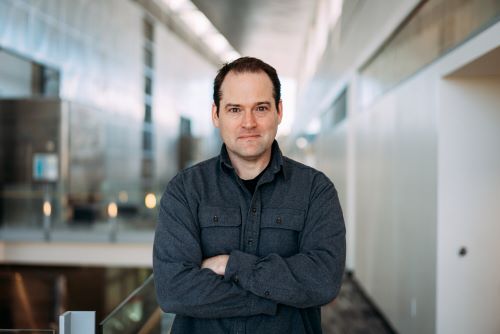May 1, 2024
Kip Ludwig to present as part of CNAP colloquium speaker series

Kip Ludwig, from the University of Wisconsin-Madison School of Medicine and Public Health, will present a talk titled "Neuromodulation/Bioelectronic Medicine Devices: The Journey from Acute Circuit Dysfunction to Long-Term Stimulation-Induced Recovery" from 2:30-3:30 p.m. Thursday, May 2, in the Engineering Hall Auditorium, Room 1109, also known as DUE 1109.
Ludwig is hosted by K-State's NIH-funded Phase II COBRE Center for Cognitive and Neurobiological Approaches to Plasticity, or CNAP, as part of the center's 2023-2024 colloquium speaker series.
This series is designed for specialists and non-specialists alike and invites leading experts to cover topics related to neural plasticity — the changing brain. CNAP invites the K-State community to join them in expanding their knowledge of neuroplasticity and brain function.
Ludwig is the co-director of the Wisconsin Institute for Translational Neuroengineering, or WITNe, and leads the Ludwig Laboratory at the University of Wisconsin within the WITNe structure. His lab focuses on developing next-generation neuromodulation therapies that use minimally invasive strategies to hack the nervous system, treat circuit dysfunction and deliver biomolecules to target areas with unprecedented precision.
Prior to Wisconsin, Ludwig served as the program director for neural engineering at the National Institutes of Health. He co-led the Translational Devices Program at NINDS, led the NIH BRAIN Initiative programs to catalyze implantable academic and clinical devices to stimulate and/or record from the central nervous system, and led a trans-NIH planning team in developing the approximately 250-million-dollar SPARC Program to stimulate advances in neuromodulation therapies for organ systems.
Ludwig also worked in industry as a research scientist, where his team conceived, developed and demonstrated the chronic efficacy of a next-generation neural stimulation electrode for reducing blood pressure in both pre-clinical studies and clinical trials. He oversaw Good Laboratory Practice and non-Good Laboratory Practice studies through his industry work, enabling clinical trials in Europe and the United States. He participated in the protocol development and execution of those trials, leading to approval for sale in 20 countries, including the United States.
Ludwig connects his academic research to the neuromodulation industry and clinical translation through multiple consulting and advisory roles. He serves as the chair of the NeuroOne Scientific Advisory Board on Artificial Intelligence, is a member of the Scientific Advisory Board for Abbott, Battelle, Blackfynn, Cala Health and the National Center for Adaptive Neurotechnologies, and is a co-founder of Neuronoff, Inc. Ludwig is also a paid consultant for the Alfred Mann Foundation, Galvani Bioelectronics, and Boston Scientific.
Visit this link to review Ludwig's PubMed peer-reviewed articles.
